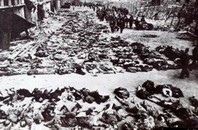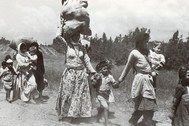9 apr 2017
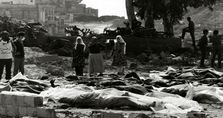
69 years ago on this day, April 9, Zionist gangs committed a heinous massacre in the Jerusalemite village of Deir Yassin, killing and slaughtering dozens of its Palestinian residents, including children and women.
Israeli war criminal Menachem Begin, leader of the Irgun gang that participated in the attack on Deir Yassin, was quoted as saying that if it hadn’t been for the massacre of Deir Yassin, there wouldn’t have been an Israeli state.
In a letter to his commanders he wrote, “Tell the soldiers, ‘you have made history in Israel with your attack and your conquest. Continue this until victory. As in Deir Yassin, so everywhere, we will attack and smite the enemy. God, God, Thou have chosen us for conquest.”
The massacre, which was perpetrated mainly by the Irgun and Stern (also known as Lehi) gangs on April 9, 1948, is unforgettable for the Palestinians, especially those who were displaced throughout the world and told the story to their grandchildren.
The day of the attack
Israeli war criminal Menachem Begin, leader of the Irgun gang that participated in the attack on Deir Yassin, was quoted as saying that if it hadn’t been for the massacre of Deir Yassin, there wouldn’t have been an Israeli state.
In a letter to his commanders he wrote, “Tell the soldiers, ‘you have made history in Israel with your attack and your conquest. Continue this until victory. As in Deir Yassin, so everywhere, we will attack and smite the enemy. God, God, Thou have chosen us for conquest.”
The massacre, which was perpetrated mainly by the Irgun and Stern (also known as Lehi) gangs on April 9, 1948, is unforgettable for the Palestinians, especially those who were displaced throughout the world and told the story to their grandchildren.
The day of the attack
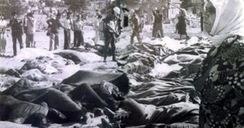
At an early morning hour, Irgun and Stern militiamen stormed Deir Yassin village near Jerusalem, and embarked on attacking its residents when they suddenly encountered fierce resistance from local men who used old Mausers and muskets to defend themselves and their families.
Four members of the gangs died and 32 others suffered injuries in the clashes, prompting them to seek help from the leadership of Haganah, another Zionist gang, which sent reinforcements to the village.
By noon over 100 people, half of them women, children and elders, had been systematically murdered by the gangs. About 25 male villagers were detained and loaded into trucks, paraded through the Zakhron Yosef quarter in Jerusalem, and then taken to a stone quarry along the road between Givat Shaul and Deir Yassin and shot to death. The Zionist gangs opened fire indiscriminately at the villagers killing 350 of them.
Eyewitnesses
Four members of the gangs died and 32 others suffered injuries in the clashes, prompting them to seek help from the leadership of Haganah, another Zionist gang, which sent reinforcements to the village.
By noon over 100 people, half of them women, children and elders, had been systematically murdered by the gangs. About 25 male villagers were detained and loaded into trucks, paraded through the Zakhron Yosef quarter in Jerusalem, and then taken to a stone quarry along the road between Givat Shaul and Deir Yassin and shot to death. The Zionist gangs opened fire indiscriminately at the villagers killing 350 of them.
Eyewitnesses
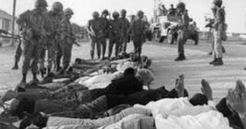
“The scenes of [Israeli] crimes in Deir Yassin are unforgettable; the massacre was horrible, terrifying and unbelievable,” Mohsen Mustafa, a resident of Ramallah, said, affirming that the Zionist gangs ripped open the bellies of pregnant women.
“The timing of the massacre was preplanned, and led to the displacement of the Palestinian people due to the passivity of the Arab media at the time,” Mustafa opined.
“The massacre happened two weeks after the signing of a peace treaty at the request of chiefs of Jewish settlements near the village,” he noted.
“The massacre was horrific, but unfortunately it recurs, somehow, in the camps of the West Bank, Syria, and Lebanon these days,” Mohamed Hasayneh, a Palestinian citizen from Askar refugee camp in Nablus said.
“The timing of the massacre was preplanned, and led to the displacement of the Palestinian people due to the passivity of the Arab media at the time,” Mustafa opined.
“The massacre happened two weeks after the signing of a peace treaty at the request of chiefs of Jewish settlements near the village,” he noted.
“The massacre was horrific, but unfortunately it recurs, somehow, in the camps of the West Bank, Syria, and Lebanon these days,” Mohamed Hasayneh, a Palestinian citizen from Askar refugee camp in Nablus said.
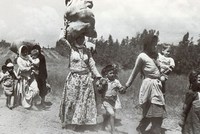
The Palestine Liberation Organization (PLO) marked on Sunday the 69th anniversary of the Deir Yassin massacre, when at least 100 Palestinians were killed by Zionist militias in the Jerusalem-area village of Deir Yassin in 1948.
PLO Executive Committee member Hanan Ashrawi mourned the “heartbreaking tragedy” in which “more than one hundred innocent men, women and children...were brutally murdered by armed members of Zionist terrorist organizations.”
Deir Yassin has long been a symbol of Israeli violence for Palestinians because of the particularly gruesome nature of the slaughter, which targeted men, women, children, and the elderly in the small village west of Jerusalem.
The number of victims is generally believed to be around 107, though figures given at the time reached up to 254, out of a village that numbered around 600 at the time.
The massacre left more than 50 young children orphaned, Ashrawi noted, adding that the deadly attack was part of a broader plan in 1948 to expulse Palestinians from their homes “with the deliberate intent of establishing the State of Israel on Palestinian soil.”
“After sixty-nine years, the Deir Yassin massacre still remains an important reminder of Israel’s systematic measures of displacement, destruction, dispossession, and dehumanization,” Ashrawi said. “The calculated efforts by Israel to completely erase the history, narrative and physical presence of the Palestinian people will not be ignored or forgotten. It is time for Israel’s lethal impunity to come to an end.”
“We urge all members of the international community to hold Israel to account immediately, to curb its ongoing violations against the Palestinians, and to support our nonviolent and diplomatic efforts to seek justice and protection in all international legal venues," she added.
The Deir Yassin massacre was led by the Irgun militia, whose head was future Israeli Prime Minister Menachem Begin, with support from other paramilitary groups Haganah and Lehi whose primary aim was to push Palestinians out through force.
Records of the massacre describe Palestinian homes blown up with residents inside, and families shot down as they attempted to flee.
The massacre came in spite of Deir Yassin resident's efforts to maintain positive relations with new Jewish neighbors, including the signing of pact that was approved by Haganah, a main Zionist paramilitary organization during the British Mandate of Palestine.
The massacre was one of the first in what would become a long line of attacks on countless Palestinian villages, part of a broader strategy called Plan Dalet by Zionist groups aiming to strike fear into local Palestinians in hopes that the ensuing terror would lead to an Arab exodus, to ensure only Jews were left in what would become modern-day Israel.
The attack on Deir Yassin took place a month before the UN Partition Plan was expected to be carried out, and was part of reasons later given by neighboring Arab states for their intervention in Palestine.
The combination of forced expulsion and flight that the massacres -- what would later become known among Palestinians as the Nakba, or catastrophe -- led around 750,000 Palestinians to become refugees abroad. Today their descendants number more than five million, and their right of return remains a central political demand.
The anniversary of the deadly razing of the village comes as modern day Palestinians in occupied East Jerusalem and the West Bank continue to face widespread illegal settlement expansion, home demolitions, detention campaigns, and extrajudicial executions at the hands of Israeli forces.
PLO Executive Committee member Hanan Ashrawi mourned the “heartbreaking tragedy” in which “more than one hundred innocent men, women and children...were brutally murdered by armed members of Zionist terrorist organizations.”
Deir Yassin has long been a symbol of Israeli violence for Palestinians because of the particularly gruesome nature of the slaughter, which targeted men, women, children, and the elderly in the small village west of Jerusalem.
The number of victims is generally believed to be around 107, though figures given at the time reached up to 254, out of a village that numbered around 600 at the time.
The massacre left more than 50 young children orphaned, Ashrawi noted, adding that the deadly attack was part of a broader plan in 1948 to expulse Palestinians from their homes “with the deliberate intent of establishing the State of Israel on Palestinian soil.”
“After sixty-nine years, the Deir Yassin massacre still remains an important reminder of Israel’s systematic measures of displacement, destruction, dispossession, and dehumanization,” Ashrawi said. “The calculated efforts by Israel to completely erase the history, narrative and physical presence of the Palestinian people will not be ignored or forgotten. It is time for Israel’s lethal impunity to come to an end.”
“We urge all members of the international community to hold Israel to account immediately, to curb its ongoing violations against the Palestinians, and to support our nonviolent and diplomatic efforts to seek justice and protection in all international legal venues," she added.
The Deir Yassin massacre was led by the Irgun militia, whose head was future Israeli Prime Minister Menachem Begin, with support from other paramilitary groups Haganah and Lehi whose primary aim was to push Palestinians out through force.
Records of the massacre describe Palestinian homes blown up with residents inside, and families shot down as they attempted to flee.
The massacre came in spite of Deir Yassin resident's efforts to maintain positive relations with new Jewish neighbors, including the signing of pact that was approved by Haganah, a main Zionist paramilitary organization during the British Mandate of Palestine.
The massacre was one of the first in what would become a long line of attacks on countless Palestinian villages, part of a broader strategy called Plan Dalet by Zionist groups aiming to strike fear into local Palestinians in hopes that the ensuing terror would lead to an Arab exodus, to ensure only Jews were left in what would become modern-day Israel.
The attack on Deir Yassin took place a month before the UN Partition Plan was expected to be carried out, and was part of reasons later given by neighboring Arab states for their intervention in Palestine.
The combination of forced expulsion and flight that the massacres -- what would later become known among Palestinians as the Nakba, or catastrophe -- led around 750,000 Palestinians to become refugees abroad. Today their descendants number more than five million, and their right of return remains a central political demand.
The anniversary of the deadly razing of the village comes as modern day Palestinians in occupied East Jerusalem and the West Bank continue to face widespread illegal settlement expansion, home demolitions, detention campaigns, and extrajudicial executions at the hands of Israeli forces.
10 apr 2016
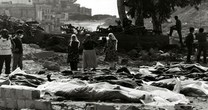
On the ninth of April 1948, Zionist gangs treacherously attacked at midnight Deir Yassin village, west of the city of Jerusalem, from several directions, taking advantage of the absence of the village's men who went out to participate in Battle of al-Qastal, while others went to Jerusalem to participate in the funeral of commander Abd al-Qadir al-Husayni.
The two Zionist military groups which had committed the massacre are; Irgun, headed by Menachem Begin, Israeli Prime Minister later, and Stern Lehi gang led by Yitzhak Shamir, who later became prime minister of the occupation state after Begin, with prior arrangements with the Zionist Haganah gangs.
The heavily-armed gangs began that night to blow up the houses of the village one by one, and burned other houses while their residents were inside them. Women and children tried to get out of the village seeking safety, but the Zionist gangs shot them on sight then searched the village and collected the people alive and shot them dead.
The massacre resulted in the martyrdom of 360 civilians, as stated in the testimony of the Red Cross delegate then Dr. Jacques de Rene. According to the narration of some survivors, the Zionist gangs mutilated the dead bodies, slit the bellies of pregnant women after betting on the sex of the unborn child, killed children and mutilated their bodies in front of the very eyes of their mothers, chopped hands, limbs and genitals, and burned some of the villagers alive, in addition to shameful practices committed against Palestinian girls before slashing their throats.
The Zionist gangs threw fifty three children alive over the old city wall. Twenty-five men were transferred via buses to Jerusalem where they were paraded in the streets of the city to celebrate the gangs’ "victory", imitating the victory parades of the ancient Roman armies, and then executed them by firing squad.
The bodies were thrown into the well of the village and its lid was tightly closed to hide the crime. The Haganah members, who occupied the village, collected other bodies and detonated them to mislead delegates from international bodies and to insinuate that the victims were killed during armed clashes.
This massacre, and other acts of terrorism and torture, was of one the vicious means pursued by the Zionist armed gangs to empty Palestine of its population through genocide and expulsion. Israel, after 32 years of the carnage (in 1980), expressed its pride in the massacre of Deir Yassin, by giving the streets of the settlement, which was built on the ruins of the Palestinian village, the names of the Zionist gangs which carried out the massacre: Irgun, Atzl, the Palmach, the Haganah.
The Deir Yassin massacre, which is marked on the ninth of April, was a cornerstone in the implementation of ethnic cleansing plan in Palestine, without which and the other massacres, the establishment of the Zionist entity could not have been made possible. In confirmation of this, Menachem Begin, former head of the Israeli government, sent a congratulatory cable to Raanan, local commander of the Irgun group, saying: "congratulations to you for this great victory, and tell your soldiers: They made the history of Israel."
In his book entitled the "Revolution", Begin wrote: The Deir Yassin massacre contributed with other massacres in emptying the country of 650 thousand Arabs, he added: "Without Deir Yassin, there would be no Israel".
The two Zionist military groups which had committed the massacre are; Irgun, headed by Menachem Begin, Israeli Prime Minister later, and Stern Lehi gang led by Yitzhak Shamir, who later became prime minister of the occupation state after Begin, with prior arrangements with the Zionist Haganah gangs.
The heavily-armed gangs began that night to blow up the houses of the village one by one, and burned other houses while their residents were inside them. Women and children tried to get out of the village seeking safety, but the Zionist gangs shot them on sight then searched the village and collected the people alive and shot them dead.
The massacre resulted in the martyrdom of 360 civilians, as stated in the testimony of the Red Cross delegate then Dr. Jacques de Rene. According to the narration of some survivors, the Zionist gangs mutilated the dead bodies, slit the bellies of pregnant women after betting on the sex of the unborn child, killed children and mutilated their bodies in front of the very eyes of their mothers, chopped hands, limbs and genitals, and burned some of the villagers alive, in addition to shameful practices committed against Palestinian girls before slashing their throats.
The Zionist gangs threw fifty three children alive over the old city wall. Twenty-five men were transferred via buses to Jerusalem where they were paraded in the streets of the city to celebrate the gangs’ "victory", imitating the victory parades of the ancient Roman armies, and then executed them by firing squad.
The bodies were thrown into the well of the village and its lid was tightly closed to hide the crime. The Haganah members, who occupied the village, collected other bodies and detonated them to mislead delegates from international bodies and to insinuate that the victims were killed during armed clashes.
This massacre, and other acts of terrorism and torture, was of one the vicious means pursued by the Zionist armed gangs to empty Palestine of its population through genocide and expulsion. Israel, after 32 years of the carnage (in 1980), expressed its pride in the massacre of Deir Yassin, by giving the streets of the settlement, which was built on the ruins of the Palestinian village, the names of the Zionist gangs which carried out the massacre: Irgun, Atzl, the Palmach, the Haganah.
The Deir Yassin massacre, which is marked on the ninth of April, was a cornerstone in the implementation of ethnic cleansing plan in Palestine, without which and the other massacres, the establishment of the Zionist entity could not have been made possible. In confirmation of this, Menachem Begin, former head of the Israeli government, sent a congratulatory cable to Raanan, local commander of the Irgun group, saying: "congratulations to you for this great victory, and tell your soldiers: They made the history of Israel."
In his book entitled the "Revolution", Begin wrote: The Deir Yassin massacre contributed with other massacres in emptying the country of 650 thousand Arabs, he added: "Without Deir Yassin, there would be no Israel".
9 apr 2016
By noon that day, all forms of resistance in Deir Yassin were eliminated, then Stern and Ergun terrorists started detonating the village’s homes, one by one, with dynamite.
Many villagers were detained, forced against walls and executed on the spot, and the terrorists then loaded cars and trucks with Palestinians captured in the village, and paraded through the streets while chanting racist slogans.
The massacre in Deir Yassin remains a historic mark in the Palestinian struggle that witnessed dozens of massacres, forcing hundreds of thousands of terrified Palestinians to fled Palestine into nearby Arab countries before the 1948 war that eventually led to occupying historic Palestine, and the establishment of Israel.
The Nakba led to the displacement of 750,000 Palestinians in 1947-48, after hundreds of villages and towns were destroyed, and depopulated.
Many villagers were detained, forced against walls and executed on the spot, and the terrorists then loaded cars and trucks with Palestinians captured in the village, and paraded through the streets while chanting racist slogans.
The massacre in Deir Yassin remains a historic mark in the Palestinian struggle that witnessed dozens of massacres, forcing hundreds of thousands of terrified Palestinians to fled Palestine into nearby Arab countries before the 1948 war that eventually led to occupying historic Palestine, and the establishment of Israel.
The Nakba led to the displacement of 750,000 Palestinians in 1947-48, after hundreds of villages and towns were destroyed, and depopulated.
Palestinians as refugees abroad. Today their descendants number more than five million, and their right to return to Palestine is a central political demand.
The anniversary of the deadly razing of the village comes as modern day Palestinians in occupied East Jerusalem and the West Bank continue to fight for their livelihood in the face of illegal Israeli settlement expansion, widespread detention campaigns, extrajudicial executions by Israeli forces, and a surge in housing demolitions -- most recently leaving 124 Palestinians homeless in a single day.
The anniversary of the deadly razing of the village comes as modern day Palestinians in occupied East Jerusalem and the West Bank continue to fight for their livelihood in the face of illegal Israeli settlement expansion, widespread detention campaigns, extrajudicial executions by Israeli forces, and a surge in housing demolitions -- most recently leaving 124 Palestinians homeless in a single day.
8 apr 2016
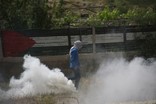
Israeli soldiers attacked, Friday, dozens of Palestinian, Israeli and international peace activists holding the weekly nonviolent protest in Bil’in village, near the central West Bank city of Ramallah. This week’s protest commemorates the 68th anniversary of Deir Yassin Massacre.
The Popular Committee Against the Wall and Settlements, in Bil’in, said the protesters marched in the village, carrying Palestinian flags, chanting for national unity, in addition to calling for removing all Israeli colonies from occupied Palestine, ongoing resistance and the release of all detainees.
Israeli soldiers fired rubber-coated steel bullets, gas bombs, and concussion grenades on the protesters and chased many of them in the Palestinian orchards.
The Popular Committee said that the head of Bil’in village Council Bassel Mansour, 40, was shot with a gas bomb in his leg, while dozens of locals, Israeli and international peace activists suffered the effects of tear gas inhalation.
Israeli gas bombs and concussion grenades also led to fires in large areas of olive orchards and lands planted with almond trees, belonging to residents Haitham Khatib and Nasser Abu Rahma.
The Popular Committee in Bil’in said that, as the Palestinians mark the 68th anniversary of Deir Yassin massacre, the history of the Israeli occupation continues to be a history of massacres and war crimes against the Palestinians, their homes and lands.
It also called on the local and international, legal and human rights group to ensure the prosecution of Israel in international courts for its ongoing crimes against the Palestinian people.
Deir Yassin Massacre took place on April 9 1948, when the Irgun and Stern terrorist Zionist armed organizations attacked the village of about 750 Palestinian inhabitants and killed more than 250-350 men, women and children; fifty-three orphaned children were left along the wall of the Old City.
The Popular Committee Against the Wall and Settlements, in Bil’in, said the protesters marched in the village, carrying Palestinian flags, chanting for national unity, in addition to calling for removing all Israeli colonies from occupied Palestine, ongoing resistance and the release of all detainees.
Israeli soldiers fired rubber-coated steel bullets, gas bombs, and concussion grenades on the protesters and chased many of them in the Palestinian orchards.
The Popular Committee said that the head of Bil’in village Council Bassel Mansour, 40, was shot with a gas bomb in his leg, while dozens of locals, Israeli and international peace activists suffered the effects of tear gas inhalation.
Israeli gas bombs and concussion grenades also led to fires in large areas of olive orchards and lands planted with almond trees, belonging to residents Haitham Khatib and Nasser Abu Rahma.
The Popular Committee in Bil’in said that, as the Palestinians mark the 68th anniversary of Deir Yassin massacre, the history of the Israeli occupation continues to be a history of massacres and war crimes against the Palestinians, their homes and lands.
It also called on the local and international, legal and human rights group to ensure the prosecution of Israel in international courts for its ongoing crimes against the Palestinian people.
Deir Yassin Massacre took place on April 9 1948, when the Irgun and Stern terrorist Zionist armed organizations attacked the village of about 750 Palestinian inhabitants and killed more than 250-350 men, women and children; fifty-three orphaned children were left along the wall of the Old City.
